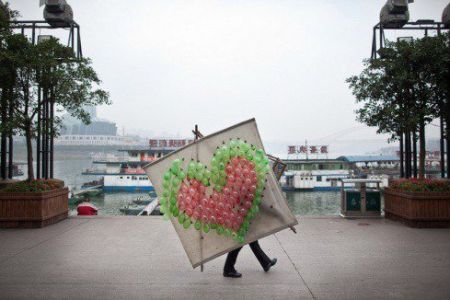martedì 24 gennaio 2012
MILAN JAROS: IN THE CAPITAL OF CONCRETE - GALERIJA FOTOGRAFIJA D.O.O., LJUBLIANA
MILAN JAROS
IN THE CAPITAL OF CONCRETE
Galerija Fotografija d.o.o.
Mestni trg 11/I - Ljubljana
25/1/2012 - 25/2/2012
Milan Jaros was born in 1979 in Prague. Between 1994 and 1998 he studied photography at the School of Graphic Arts and in 2004 graduated at the School of Photography FAMU in Prague. During his study he made the reportage about the Roman community in Slovakia and got interested in documentary photography. Currently he works for Respekt magazine (www.respekt.cz), known for its investigative journalism and in-debt articles. In his photography opus he is mostly covering Czech social topics like Romany community, rising of racism, homosexual prostitution, agricultural life and crises situations in Georgia, Lebanon, Israel.
His work has been published in legendary NY Times, International Herald Tribune, l´Hebdo, Courriere International, Chicago Tribune, Respekt and Reflex. In 2009 he won UniCredit Bank Young Photo Award, as well as the 1st prize for daily life stories at Czech Press Photo 2009. In the same year he was granted Prague Mayor's grant for portraits and received the 2nd prize at Unicef Photo Award. In 2010 he again won the Czech Press Photo award: he received the 3rd prize for Spot News category and the honorable mention in Everyday Life category.
In the capital of concrete
During all day, kilometres long strolls, the view in front remains the same. In the smog and clouds on the horizon, silhouettes of new and new skyscrapers are appearing. There are so many of them, that the whole twenty minute taxi-drive to the train station passes through an alley of 30 to 50 storey, not entirely finished grey buildings. We are in a city, which is maybe the most ambitious urban project of our times, in the Chinese version of Batman’s Gotham City, in the central Chinese city of Chongqing.
Chongqing is probably the largest metropolis of the World that you have never heard of – 32 million people live in its administrative borders, X million in its urban area. It should become the future of China, the crossroad where the riches of the coastal provinces find their way to the still impoverished hinterland. The Beijing government would like to build this megalopolis on the Yangtze River into a Chinese version of Chicago, which was the 19th century embarkation ramp on which the riches of the East coast flowed to the West. Therefore the central government invests billions of dollars. The local economy grows twice as fast as the Chinese average and foreign companies are beginning to follow the government. They can pay lower salaries to their workers here then on the East coast where workers´ strikes proliferate from year to year.
The rise of China started 30 years ago around the coastal cities of Shanghai, Shenzhen or Guangzhou – it was dependent on foreign investors that produced cheap goods for export to Europe and America. Chongqing is different. Mainly Chinese firms invest here and 90 percent of local production is sold in China. It is a Chinese megalopolis for the Chinese.
Now the city lives in token of cranes. They are the highest spots on the horizon and there is probably no street from which you can’t see a crane. The iron machines work in breathtaking pace even compared with already high Chinese standards. They must build enough estates for one million people who move to the urban areas every year, ten million will come from the rural areas in the next ten years. Already now the city is plagued by eternal noise and smog that hides the sun for most of the year.
Islands of a disappearing world survive under the skyscrapers and under the ambitious plans that are exhibited in the museum of urban planning. They survive in small one or two storey houses that will be demolished in the months to come. Men sit in front of the door on a stair, feet in a dock of warm water. Ten women are sewing clothes in a small work-shop. New pubs and karaoke bars open directly under the concrete of new concrete overpasses. In one of them, just now, a man sings a Chinese ballade; women sit on plastic chairs and prepare their hands to clap.
- Tomas Lindner
